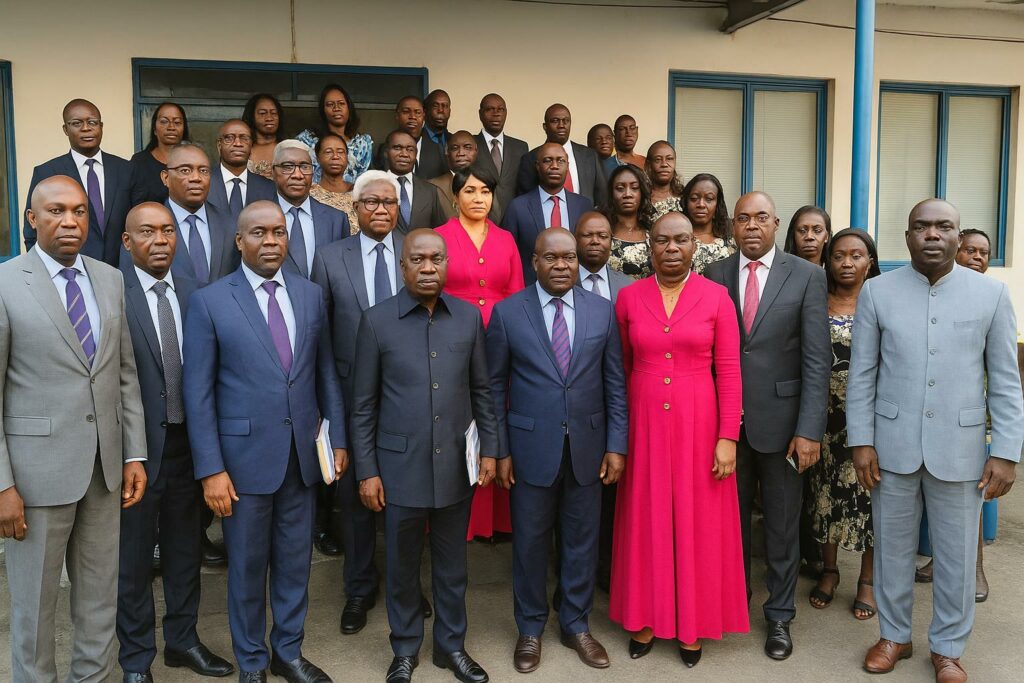A Compact Edition with Expansive Energy
Condensing three traditional days into one, the eighth Rentrée littéraire du Congo gathered writers, editors, scholars and hundreds of students on 26 September at the French Institute of Brazzaville. The organisers from PEN-Congo had opted for a streamlined format, citing logistical constraints; yet the crowd’s enthusiasm suggested that less time did not mean less substance. Throughout the day, corridors buzzed with improvised readings, autograph sessions and spontaneous debates in both Lingala and French, reaffirming the event’s reputation as the country’s foremost marketplace of ideas.
In his opening remarks, PEN-Congo president Florent Sogni Zaou praised the “collective resilience that allows literature to flourish whatever the circumstances”. Ministerial representatives greeted the initiative as a contribution to the national goal of elevating cultural industries within the Development Plan 2022-2026, two months after Brazzaville earned the African Capital of Culture label.
Rooted Voices, Global Horizons
The inaugural lecture, delivered by novelist and departmental director of books Alphonse Chardin N’Kala, set the intellectual tenor. Entitled The Book as a Tool of Cultural Rooting and Openness to the World, the address wove together autobiographical reminiscence, literary theory and civic exhortation. “To protect the book is to protect our right to belong somewhere while travelling everywhere,” he asserted, echoing predecessors such as André-Patient Bokiba.
A first round-table, moderated by critic Fidèle Biakoro, showcased five contrasting but complementary oeuvres. Poet César Balthazar Obambi explored love and anguish in Des mots, de l’amour et des larmes; Octave Mouandza dissected moral disarray in Longue vie pour rien; Kali-Tchikati pursued a quest for dignity in Les ailes du rescapé; Dominique Asie de Marseille offered a political allegory in La République du colonel; and Lewa-Let Mandah merged memoir and manifesto in L’appel au devoir patriotique. Personal anecdotes punctuated the exchanges, underscoring how literary craft can simultaneously anchor memory and beckon the reader toward unfamiliar horizons.
Publishers Call for Structural Reform
If authors embodied creative effervescence, publishers highlighted the less glamorous but decisive economic side of the value chain. During the second panel, Mukala Kadima Nzuji of Éditions Hémar and Weldy Télémine Kiongo, better known as ING, from Mwéné Édition enumerated escalating printing costs, limited distribution channels and the scarcity of professional translators as primary bottlenecks. From the floor, Modeste Gboko of Fnac insisted on targeted communication strategies, while academic Omer Massoumou defended rigorous reading committees as guarantors of literary quality.
Consensus emerged around the need for a national framework harmonising tax incentives, copyright enforcement and export facilitation so that books printed in Brazzaville may circulate more easily across the CEMAC market. Participants welcomed the announced study, co-financed by the Ministry of Culture and the African Publishers Network, on establishing a Congolese Book Fund to underwrite debut titles.
Literature Meets Music, History and Social Inquiry
An afternoon conversation moderated by essayist Ninelle Balenda broadened the spectrum of disciplines. Ferréol Gassackys introduced his study Pachelbel, an Unknown Genius, using the Baroque composer as a springboard to defend the universality of artistic emotion. The dialogue then turned to contemporary narratives: Émile Gankama revisited urban illusions in La cité d’attache du vieux port and denounced identity essentialism in his polemic Tribaliste toi-même; Nicole Mbala described her forthcoming À l’ombre des nœuds, inspired by women’s pandemic testimonies; Étienne Pérez Epagna addressed faith and betrayal in Le rêve piégé de Manza; and, through a recorded message, Malachie Cyrille Ngouloubi presented Félix Tshisekedi, racine du progrès, a poetic meditation on leadership.
The cross-fertilisation between prose, poetry and melody illustrated, in Balenda’s words, “the encyclopaedic appetite of Congolese creators, unafraid to marry the mbongui’s oral tradition with global references from Pachelbel to post-modernism”.
À retenir
Despite its compressed schedule, Relico 2024 reaffirmed two constants: first, Congolese writers continue to negotiate the delicate balance between cultural rootedness and cosmopolitan dialogue; second, sustainable growth of the sector now hinges on professionalising the publishing chain, from financing to foreign rights. The day ended with veteran intellectual Zacharie Bowao saluting “a youth determined to conjugate memory in the future tense”, a formulation that resonated long after lights were dimmed in the auditorium.
Le point juridique/éco
Panel discussions repeatedly circled back to the legal scaffolding that sustains creative freedom. Speakers welcomed the 2022 Copyright Act, which strengthened authors’ remuneration and introduced alternative-dispute mechanisms, yet deplored uneven enforcement outside Brazzaville. Economists in attendance estimated that local publishing represents barely 0.3 % of national GDP, arguing that clearer fiscal incentives, such as zero-rating paper imports, could double the figure within five years. International partners present at the forum signalled readiness to provide technical assistance, provided transparency benchmarks are met. For practitioners, the convergence of legal certainty and economic stimulus will determine whether the promise heard in festival halls can translate into jobs and export receipts.

